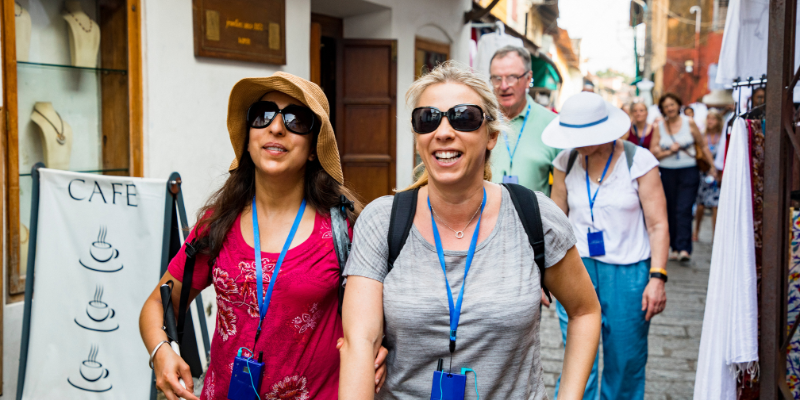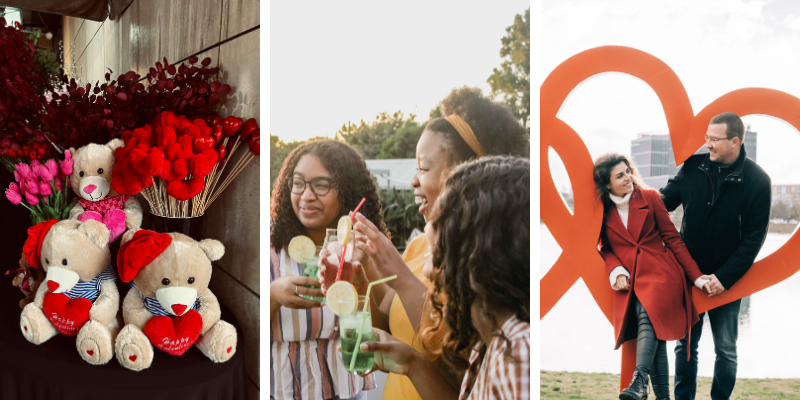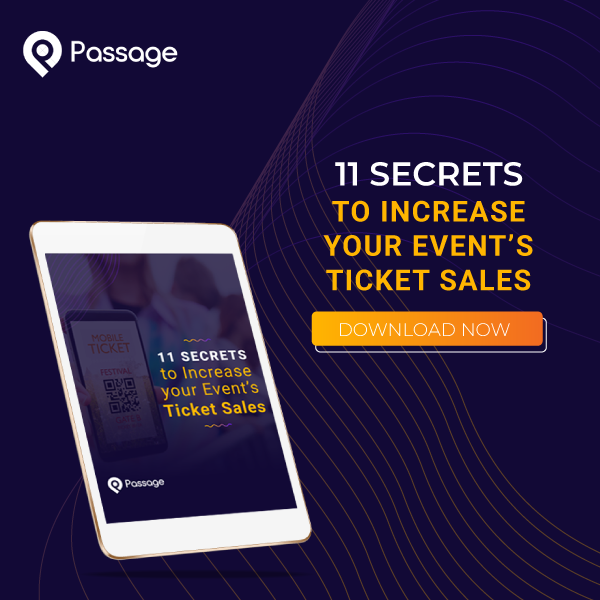Taking a guided tour led by a local expert can be one of the best ways to explore a new city, or to learn more about the place you live.
There are so many different modes of transportation you can use to lead a tour, whether that’s walking, a bus, Segways, a boat, helicopter, or even a pedal pub. And there’s a tour for just about every interest: architecture tours, history tours, ghost tours, bar crawls, TV and movie tours, culinary tours—the list goes on.
Organizing a successful local tour not only requires extensive knowledge of your city, you also need to have a well-organized ticketing strategy. This will help you stay organized, make it simple for guests to book their tour, and can even help boost your revenue. In this blog, we’ll break down how to build the right ticketing strategy for your business, including our top tips for marketing and promoting your tours.
What Types of Tickets Should I Sell?
You might think there’s only one way to sell tickets for a local tour, but the options are almost endless. Should you sell online or in person? Single admission or group passes? We’ll make it simple. Here are the best ticket types we recommend for tours and activities.
Timed or Date-Based Tickets: Most tours have a limited number of spots available. Offering timed or date-based tickets can help manage crowds and ensure a balanced experience for all guests. This allows you to control the number of guests participating in an activity at any given time. Our friends over at the City Institute in Detroit have a great example of simple yet effective date-based ticketing over on their event page. Check it out!
Group Tickets: Tours are a popular activity for groups of people traveling together, such as birthday parties, corporate events, and family reunions. Offering group tickets at a slight discount from your standard ticket gives larger parties an incentive to book together, and can help you book out entire time slots more quickly.
Private or Small Group Tours: Some guests are willing to pay a premium for a more exclusive experience. Your standard tour might accommodate 10 or even 20 guests at a time. But if a family of four wants a private tour and they’re willing to pay extra for it, why not give them the option of booking a private tour just for themselves? If you’re using Passage, you can convert an open time slot to a private event with one click, making this super convenient for you and your guests.
Bundled Tickets: Wouldn’t your guests love to take home a souvenir or locally made product to remember their visit? If you’re using Passage for your ticketing, you can bundle tickets and products together, For example, pair your tour admission with a jar of jam from your farmers market and a tote bag produced by a local artisan.
In the end, you don’t have to choose just one. Guests will appreciate having the option to choose which one works best for them. Ultimately, you should choose a ticketing platform that allows you to create multiple ticket types to cater to each guest.

Marketing and Promotion
Once you start selling tickets, it’s time to spread the word. Here are some effective tips to promote your your and maximize your sales:
Leverage Social Media
Use platforms like Instagram, Facebook, and TikTok to showcase your tours through engaging content. Create posts, stories, and videos highlighting unique aspects of your tours. Encourage user-generated content by asking participants to share their experiences and tag your business.
Collaborate with Local Influencers and Bloggers
Partner with local influencers who can reach your target audience. Offer them complimentary tours in exchange for promotion on their platforms.
Utilize Online Advertising
Run targeted ads on Google and social media platforms to reach potential customers. Use retargeting ads to remind people who have visited your website or shown interest in your tours.
SEO and Content Marketing
Optimize your website for search engines by using relevant keywords. Start a blog sharing interesting stories about the locations you cover, tips for tourists, and related content to attract organic traffic.
Partnerships and Collaborations
Work with Local Hotels and Hostels
Form partnerships with local accommodation providers to offer their guests exclusive discounts.
Leave brochures and promotional material at their reception areas.
Collaborate with Travel Agencies and Tour Operators
Partner with travel agencies to include your tours in their packages. Offer commissions for tickets sold through their channels.
Customer Engagement and Incentives
Offer Discounts and Promotions
Provide early bird discounts, group rates, and special promotions during off-peak times. Use promo codes for online bookings to track the effectiveness of your marketing campaigns.
Loyalty Programs
Implement a loyalty program where repeat customers can earn points or discounts on future tours.
Excellent Customer Service
Ensure excellent customer service to encourage word-of-mouth referrals. Collect and showcase positive testimonials and reviews.
Technology and Accessibility
Online Booking System
Invest in a user-friendly online booking system like Passage that allows customers to easily book and pay for tours. Ensure your website is mobile-friendly as many users will book via their smartphones.
Listing on Major Travel Platforms
List your tours on popular travel and activity booking platforms like TripAdvisor, Airbnb Experiences, and GetYourGuide.
Unique Selling Points
When promoting your tour, emphasize what makes yours unique, whether it's an exclusive route, a unique theme, or expert guides. Use high-quality photos and videos to showcase these unique aspects. Here are a few selling points you might want to include:
Local Expertise
- Knowledgeable Guides: Tour guides are often locals with in-depth knowledge about the city’s history, culture, and hidden gems. They provide insights and anecdotes that you might not find in guidebooks or online resources.
- Context and Stories: Guides share fascinating stories and historical context that bring the city’s landmarks and attractions to life.
Efficient Use of Time
- Well-Planned Itineraries: Guided tours are designed to maximize your time by covering significant sights and attractions efficiently.
- Avoid Getting Lost: With a guide leading the way, you won’t waste time navigating or getting lost in unfamiliar areas.
Access to Exclusive Sites
- Special Access: Some guided tours offer access to exclusive or less-known sites that are not available to the general public.
- Skip the Lines: Many tours include skip-the-line privileges, allowing you to bypass long queues at popular attractions.
Cultural Immersion
- Authentic Experiences: Guided tours often include visits to local markets, neighborhoods, and eateries, providing an authentic experience of the city’s culture.
- Interaction with Locals: Guides can facilitate interactions with locals, enhancing your cultural understanding and making the experience more personal.
Safety and Convenience
- Safe Exploration: A guided tour ensures that you explore the city safely, especially in areas that might be challenging to navigate alone.
- Hassle-Free Logistics: Transportation, entrance fees, and other logistics are usually handled by the tour operator, allowing you to relax and enjoy the experience.
Social Experience
- Meet Fellow Travelers: Joining a guided tour is a great way to meet and connect with other travelers, sharing experiences and making new friends.
- Group Dynamics: Exploring with a group can be more fun and engaging, with shared stories and experiences.
Educational Value
- Learn As You Go: Guided tours are educational, offering insights into the city’s history, architecture, art, and culture.
- Interactive Learning: Many guides use interactive elements, such as quizzes or demonstrations, to make learning more engaging.
Customized Experiences
- Specialized Tours: Many guided tours cater to specific interests, such as food tours, historical walks, art and architecture tours, or adventure tours.
- Tailored Recommendations: Guides can provide personalized recommendations based on your interests, whether it’s restaurants, shops, or other attractions to visit after the tour.
Memorable Experiences
- Unique Insights: Guides often share lesser-known facts and stories that create memorable and unique experiences.
- Photo Opportunities: Guides know the best spots for taking photos, ensuring you capture beautiful memories of your trip.
Final Thoughts
A guided tour can enrich your guests’ travel experiences, offering a deeper understanding and appreciation of the city they are exploring. By implementing these strategies, you can increase visibility, attract more customers, and ultimately boost your ticket sales for your tours and local activities.













